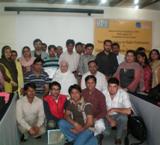Improving Access to Online Information in Rural Areas
| This was a capacity building project which aimed to train rural journalists so that they may also become active participants in the national press freedom-monitoring network. The training was expected to raise the awareness of rural journalists on issues concerning freedom of the press, impart skills to monitor and defend freedom of expression, allow journalists in rural areas to further train other journalists to effectively defend and promote freedom of expression and increase journalists' capacity to campaign nationally and internationally to discourage attacks on journalists and media. Also it was proposed under the current project to set up a web unit in English and Urdu languages so the press freedom violations and freedom of expression newsletter Sadiq News could be published online. Participants were supposed to receive training in areas such as web content writing and editing and use of online technologies, online journalism and e-governance. |
Workshop for Photo Journalists on Coverage of Community
|
The recent advances in information, digital and printing technologies have opened new opportunities for rural journalists. The explosive growth of Internet and opening of independent channels have resulted in the dramatic increase in the use of computers as well digital cameras. Advances in printing technologies and increase competition among newspapers has let to increasing use of photographs. However, very little emphasis has been placed on training of photographers and the potential of photo coverage from rural areas has not been fully realized. There is pressing need to train photojournalists in professional and technical advances. This was a capacity building type of a project with special emphasis on photo-journalists. The aim of this project was to introduce district journalists to recent advances in digital photography and current trends in photojournalism and to develop their capacity to cover the political, economic, social and cultural events and development in their areas. Trainings of Environmental Journalists: Pakistan Press Foundation (PPF) successfully implemented a project titled “Capacity Building of Environmental Journalists” The project has helped deepen understanding of participants on key environmental challenges and issues, enhanced visibility of environment as a theme via media reporting and increased public awareness on environment and issues. To achieve these objectives Pakistan Press Foundation (PPF) organized two media workshops in January 2010 in Karachi and Lahore to build capacity of media practitioners on covering environment. The workshops developed the capacities of journalists in covering environmental concerns; raise environmental awareness of public through strengthening environmental journalism and encourage public participation in environmental decision making through innovative techniques of communication and cooperation between environmental stakeholders. Twenty four journalists from across Pakistan were selected for the training workshops. The training participants included national, provincial and local level journalists from print radio and television media. PPF also created a Facebook page "Pakistan Press Foundation - UNESCO Workshop on Environmental Journalism" that has the potential to initiate an informal network for journalists working on environment and its related themes. |
Media Awards
|
UNESCO Islamabad supports the Gender in Journalism and Press Freedom Awards through Pakistan Press Foundation (PPF). The Gender in Journalism Awards recognize excellence in gender sensitive reporting. The awards are open to both female and male journalists. Each year one Award is given to a male or female journalist providing the best coverage on gender issues. The other recognizes competence and contribution of women in journalism in Pakistan. The Annual Aslam Ali Press Freedom Award was instituted in 2006. The Award recognizes journalists who have made significant contribution to press freedom in Pakistan. Each year, announcements inviting entries for these Awards are widely circulated throughout the country. Entries are screened and short-listed in two phases. Finalists are judged by a panel of judges. UNESCO and PPF select jury members from among eminent journalists, academic, human rights experts, and journalists associations. Efforts are made to ensure gender balance and diversity of languages, viewpoints and geographical distribution among the selected judges. PPF acts as both convener and secretariat of the jury. Past awardees of the three Awards are listed hereunder. Gender-sensitive reporting: 2003: Reema Abbasi Hamidi and Hussain Askari 2004: Manzoor Solangi 2005: Fauzia Shaheen 2006: Razia Fareed 2007: Faiza Ilyas 2008: Masood Ansari Women in journalism: 2003: Saira Irshad Khan 2004: Shimaila Matri 2005: Huma Yusuf 2006: Afshan Subohi 2007: Fauzia Shaheen 2008: Qudsia Akhlaque Press freedom: 2006: Hyatullah Khan 2007: Mukesh Rupeta |




